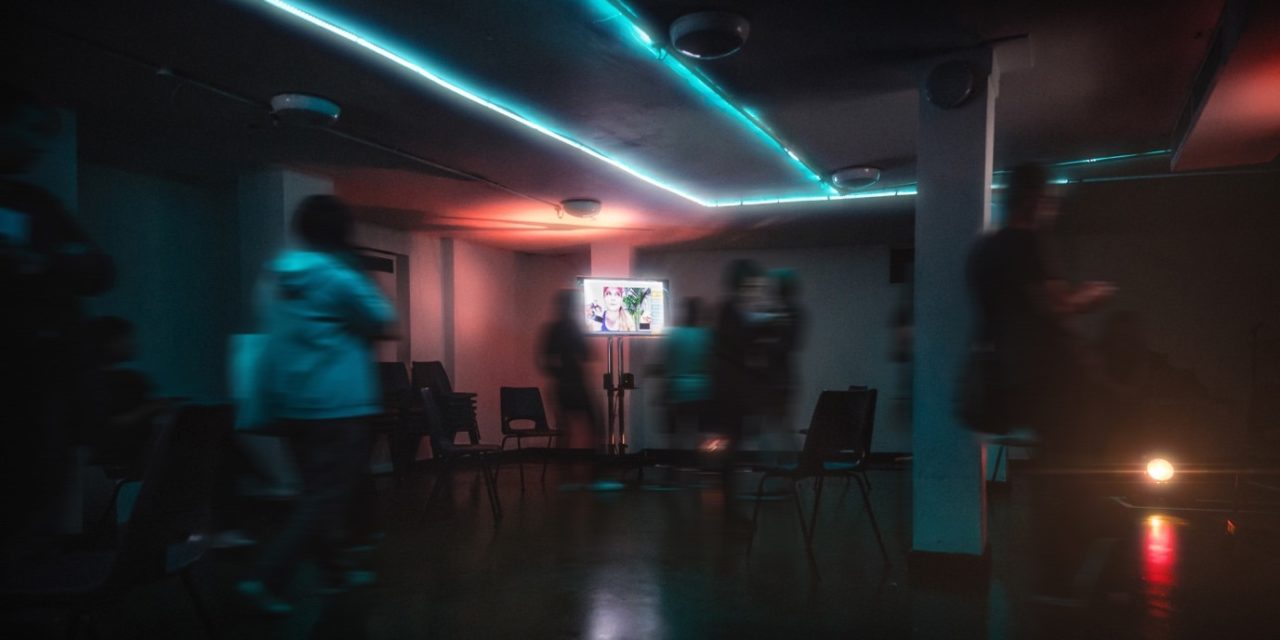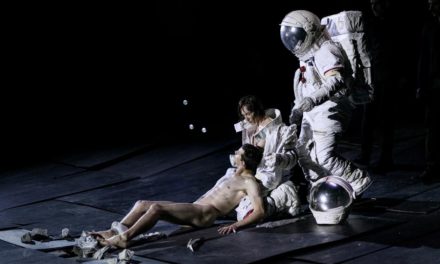Exploring the common phenomenon of livestream communication in modern society, the performance collective Factory Irregular came up with their new mixed media show Together, a recreation of the online broadcasting experience performed in the basement of Camden People’s Theatre. An unconventional show closer to behavioral art than to theatre, Together asks audiences to use their phones to text performers throughout the show. Although the experience is only an hour long, it is enough to bring us many observations and thoughts about media communication. Watching people online and texting them is nothing unusual in our lives, as platforms like Mixer and Twitch rise in popularity. However, putting such actions in the context of “a show in a basement” forces us to see mundane activities in a different way.
At the top of the show, three livestreamers presented themselves on three screens in different corners of the space, waiting for the audience to initiate chats through an online system. Each was engaged in a different mundane activity–eating, chatting, or doing their makeup. Their bios were attached to the bottoms of the screens for the audience members to choose which one to interact with. Where they really were remained unknown to us. We only knew that if we texted them the messages would be displayed on the right side of the screen and that the livestreamers would do their best to respond and engage. We were free to text anything to the performers, to watch with detachment, to move away, or even to text our friends. However, talking to other people in the space was not allowed. Soon, the strange quietness among us became a bit uncomfortably obvious. I began to feel awkward when my urge to talk with friends was silenced, and more aware that I was being forced to accept the situation.

Factory Irregular’s Together at Camden Underground, London. Photo: Cao Cong
Observing from the sidelines, I found myself amused by the different interactions. At one point, I saw half the audience gathered in front of one screen, some even shouting with excitement, while on the other side a serious looking livestreamer had only one or two viewers. Is the guy who initially asked him the question still there to listen to the answer? I wondered. It was obvious that if the broadcaster couldn’t react to the flood of messages in a timely manner, viewers lost their interest quickly. Because of this reality, conversations mostly stayed at the surface level, and were easily diverted or cut off when still unfinished.
I have never been a fan of online broadcasting, yet I felt really satisfied when the broadcaster read out my message and responded–I was picked, among the many impatient spectators waiting for their texts to be chosen. It also felt magical that through a piece of text, I could affect someone who might actually be at the other end of the world. The whole procedure lasted about an hour until, one by one, the livestreamers ended their livestreams, saying goodbye to everyone. Although most of the time nothing significantly exciting happened, the audience I was part of found ourselves so used to their company that the parting was prolonged and sad.
Founded remotely by two Chinese artists, Mengting Zhuo and Yujing Yan, in Beijing and London in 2016, Factory Irregular collaborates internationally and explores creative forms that truly speak to the universal dilemma in our time. Together invites people to reassess livestream communication by making them relive the experience in a more intentional way. “Today, some people spend hours online livestreaming or watching mundane activities. I think the reason behind it is that they are lonely, but does this really help?” said Mengting Zhuo, one of the show’s creators.
Through the experience, we can feel that the sense of loneliness is still there because no deep connection can be created in such fast-paced, shifting interactions.

Factory Irregular’s Together at Camden Underground, London. Photo: Max Hsieh.
How did I feel as an audience member? To be honest, I was quite bored most of the time, feeling lonely, and empty as well, partly because there was a lack of variety in the pacing, and things looked trivial after the beginning. But in a sense, the monotony created an atmosphere in which anything slightly different from predicted could become special. And when you realize the overall power dynamics of the piece, things become even more exciting–you are hidden behind your phone, so you are empowered to experiment with anything; insulting a stranger or confessing your secrets bears little consequence. On the livestreamers’ side, the large groups of viewers, albeit unseen and unknown, fulfill their need for attention. These effects are not uncommon in the real online world.
Despite the exciting possibilities of watching and manipulating others from afar with information technology, I came away from Together feeling that livestreaming really can’t replace having a face-to-face interaction with others. The lack of deep conversation, the triviality of most of what had happened, and the pointlessness of remote manipulation all made me cherish talking with the person beside me more. Shaping and shaped by the fleeting moments of online interaction, we may come to realize that the choice of what kind of connection we seek in our life is in our hands.
Concept & direction: Mengting Zhuo & Yujing Yan
Performance: Smaragda Kara, Chidi Omari & Yujing Yan
Software design: Piotr Mirowski
Light design: Eva Collins Alonso
Graphic design: Yujing Yan
Together ran at Camden Underground on September 18 and 19, 2018, and has been selected for the Prague Quadrennial of Performance Design and Space 2019. For more information about the show, see: https://www.cptheatre.co.uk/production/together/
This post was written by the author in their personal capacity.The opinions expressed in this article are the author’s own and do not reflect the view of The Theatre Times, their staff or collaborators.
This post was written by Haylin Cai.
The views expressed here belong to the author and do not necessarily reflect our views and opinions.


















